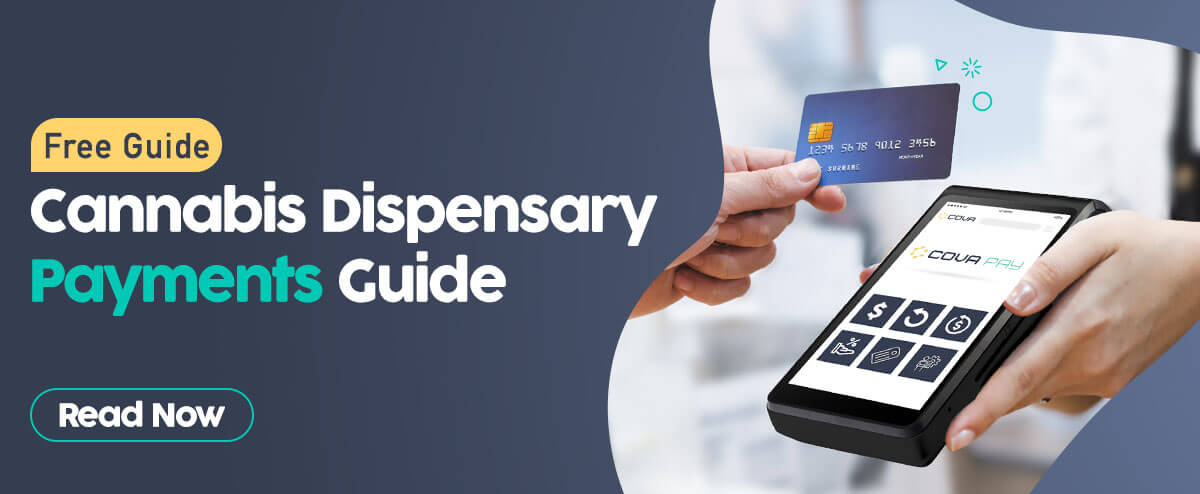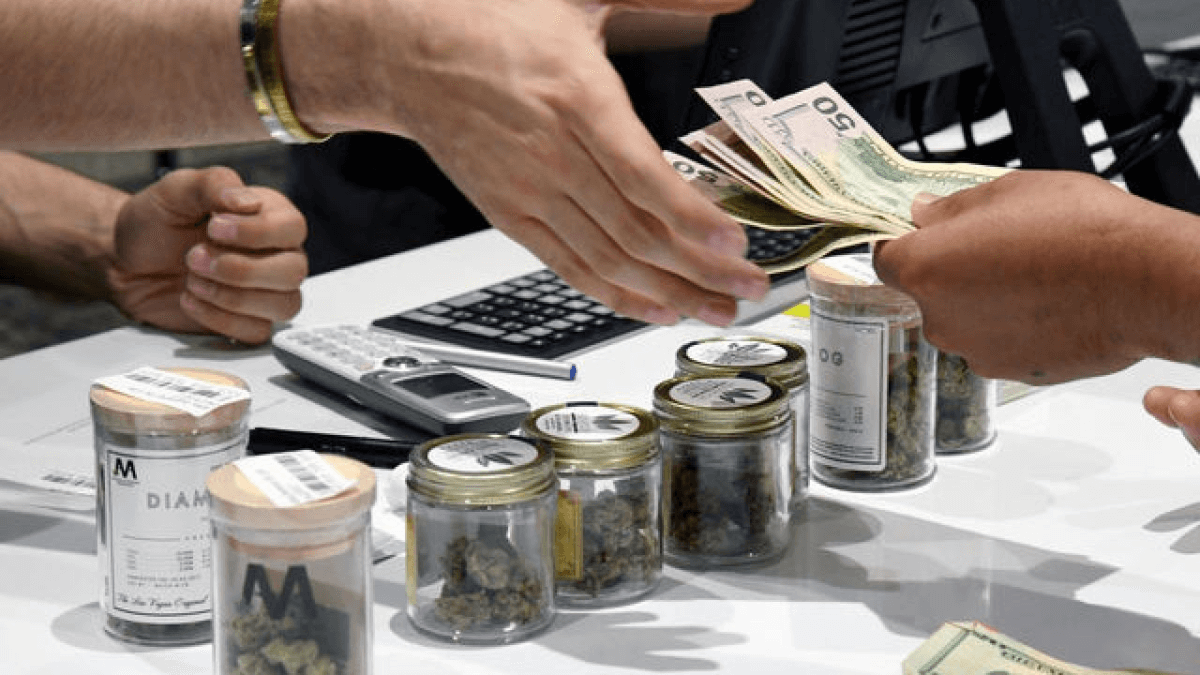Navigating the Confusing, Crowded World of Cannabis Payments

When you’re a cannabis retail operator looking for electronic cannabis payment solutions you’re faced with a baffling array of options and it’s hard to pick out the ones you can trust and the ones that you should avoid at all costs. Every potential vendor is going to tell you that their solution is the best (trust me!) so you need to understand the basic landscape of cannabis payment solutions in order to know what questions to ask. There’s a lot of solid vendors out there that only want to help the industry but there are, sadly, those out there that prey upon a lack of familiarity with the crowded, confusing payments landscape to push solutions that are at best unsustainable and at worst fraudulent.
ACH transactions are a way for a person or a business to do direct bank money transfers.
These transactions are conducted on a computer network run by NACHA, the National Clearinghouse Association. Since these don’t run over the networks run by the credit card companies like Visa or Mastercard – known as “payment rails” – these transactions don’t violate their rules. While NACHA hasn’t officially made a statement either way about cannabis, their actions suggest they don’t have an issue processing these transactions over their network.
The downside with many ACH solutions is that they aren’t necessarily convenient for the buyer. Because a customer or patient can’t just pull out a bank card they are often required to download an app and provide banking details like account and routing numbers. This isn’t necessarily an issue from the second purchase forward, but this can be a bit of a pain for a customer or patient trying to use an app for the first time if they’re not expecting to have to go through an account onboarding process that might take several minutes. The upside to this is that there are platforms that allow the buyer to upload funds via ACH to an eWallet, which, after the initial transaction, will enable them to make instant purchases. Platforms also allow the buyer to automatically replenish their eWallet via ACH, allowing them to always have funds to make purchases. These purchases can also be combined with a store’s loyalty points program.
Questions to ask about ACH solutions:
- What does a customer or patient need to do to use the solution?
- How long does it normally take for the funds to transfer, allowing a user to make purchases?
- Are there any contactless platforms that allow a buyer to purchase the product for delivery or curbside pickup?
- Do you need additional hardware to display a single-use QR code specific to the transaction?
Cashless ATMs and PIN Debit solutions are among the most common electronic payment methods that allow customers to directly use cards.
To discuss the issues that go along with any card-based solution we need to take a step back and talk about how payments are processed. As previously mentioned, every credit card company has a set of rails used by merchants to process a sale over their network. Each transaction is sent as a packet of information that broadly contains the following information: name of business, location of business, any additional merchant information, and merchant category code (MCC).
Every transaction has to be associated with a four digit MCC used by the merchants to indicate the nature of the business and the transaction. The code that’s traditionally been used by cashless ATMs and PIN Debit solutions is 5912, reserved for pharmacies and “cannabis (where legal to do so)”. This is what’s used in Canada where credit cards are an option but it’s not an acceptable option in the US because the major credit card networks have clarified that their rails cannot be used for the purchase of marijuana. They do so by prohibiting activities associated with “controlled substances, or recreational/street drugs” (VISA) or even more broadly “any Transaction that is illegal” (Mastercard) in their operating agreements.
It’s important to note that you can’t just randomly choose an alternative MCC because miscoding constitutes fraud. You may remember a few years ago that California-based delivery company Eaze was prosecuted in 2019 for using MCC codes associated with things like “carbonated drinks, green tea, face creams and other products” in an attempt to obscure the fact that the network was being used for the direct purchase of marijuana.
It should be noted however that there are a few ATM networks out there that aren’t directly owned by the big credit card companies like NYCE, Allpoint, Star, and Moneypass. These companies have been relatively quiet regarding the use of their networks for the purchase of marijuana products, so there is an argument to be made that if card transactions are sent over those rails they’re not violating any operating rules, but anecdotally we’ve heard that some of these networks aren’t necessarily cannabis friendly and, as private companies, they’re able to change their mind (for or against) whenever they wish.
Questions to ask about Cashless ATMs and PIN Debit solutions:
- What MCC code is the payment processor using?
- What network is being used to process the transaction?
Credit cards are notoriously off-limits to cannabis because of the very public positions taken by the major card networks but that doesn’t stop companies from popping up offering credit card processing for cannabis purchases. Let’s clarify here at the outset – there is no way to directly purchase marijuana with a credit card in the United States with a credit card from American Express, Visa, Mastercard, or Discover.
So, with necessity being the mother of invention, some companies are trying out a new strategy to get credit card processing into dispensaries legally. Among them are solutions that take advantage of another MCC code: 6051. This code is associated with the purchase of “liquid and cryptocurrency assets” and some enterprising payment providers are using it to set up a structure where a customer isn’t “technically” buying marijuana. Instead they are “buying” what’s called a “stablecoin”, a form of cryptocurrency whose value is pegged 1:1 to the US dollar.
Questions to ask about cryptocurrency or stablecoin solutions:
- What MCC code is the payment processor using?
- What stablecoin is being leveraged?
- How is the stablecoin preserving its value?
- What will the offramping of funds from a crypto wallet to my DDA account look like to my bank?
Cannabis retail operators are faced with serious business and legal considerations when determining the payment processing solution provided to patients and customers. What solution will be the easiest for the customer? Is the solution compliant?
The cannabis industry’s evolving legal and regulatory landscape is challenging, especially with bad actors seeking to implement non compliant make-shift payment solutions intended to capitalize off of cannabis businesses seeking efficient and effective cannabis payment solutions. It is essential that you do your due diligence on cannabis payment solutions presented to your business to confirm that it will not cause an issue for you, the business and its patterns and customers. We hope that this article outlines considerations that will allow you to protect your business and its patients and customers.
Member Blog: What Does The SAFE Banking Act Mean for the Cannabis Insurance Landscape?

by Valerie Taylor, Vice President (National Cannabis Practice Leader), The Liberty Company Insurance Brokers
As an insurance professional and broker who worked with more than 70 cannabis clients, I have seen firsthand how the lack of access to traditional banking services has affected cannabis businesses. The cannabis industry has faced many hurdles since its inception, and access to traditional banking services has been one of the biggest obstacles. This has created significant challenges for cannabis businesses, forcing them to operate on a cash-only basis and creating safety concerns.
The SAFE Banking Act is a necessary step toward creating a more supportive regulatory environment for the cannabis industry. The act would provide greater transparency into financial transactions and encourage more insurance companies to enter the market. This would benefit not only the cannabis clients but also the insurance companies by providing greater coverage options.
The current situation has a significant impact on the life of a cannabis business owner/operator. Banking with a cannabis bank can be expensive, driving down profits. Cashless ATMs and payment processing platforms have costs associated with them, which also drive down profits or are pushed onto the consumer. Additionally, accepting cash increases the risk of theft, leading to the need for expensive security measures. What’s more, investing in an adequate safe is required by insurance carriers, which can also be costly and further drive down profits. Due to the cash-intensive nature of the business, insurance companies offer limited coverage on cash.
Passing the SAFE Banking Act could help solve these issues by providing cannabis businesses with greater access to banking services, which would help them manage their finances more efficiently and effectively. This would also provide greater transparency into financial transactions, making it easier for insurance companies to assess risk and provide coverage options.
Moreover, the passage of the SAFE Banking Act would help create a more supportive regulatory environment for the cannabis industry. The current lack of access to traditional banking services has created significant challenges for cannabis businesses, forcing them to operate in a largely unregulated environment. This makes it difficult for them to comply with regulations and puts them at a disadvantage compared to other industries.
The cannabis industry is still in its early stages, and it requires significant capital to operate. Without access to traditional banking services, cannabis businesses struggle to obtain loans or lines of credit, making it difficult for them to grow and expand. Passing the SAFE Banking Act would provide cannabis businesses with greater access to capital, which would help them invest in their businesses and drive growth.
Finally, passing the SAFE Banking Act would benefit insurance companies as well. By providing greater coverage options, insurance companies would be better able to serve the needs of the cannabis industry. Additionally, the act would encourage more insurance companies to enter the market, which would increase competition and drive down costs for cannabis clients.
Overall, passing the SAFE Banking Act is a necessary step toward creating a more supportive regulatory environment for the cannabis industry. It would provide cannabis businesses with greater access to banking services, help them manage their finances more efficiently and effectively, and provide them with greater access to capital. This would benefit both cannabis clients and insurance companies, and I strongly believe that policymakers should take swift action to support this growing industry.
 Valerie Taylor, Producer, Vice President and National Cannabis Practice Leader, The Liberty Company Insurance Brokers
Valerie Taylor, Producer, Vice President and National Cannabis Practice Leader, The Liberty Company Insurance Brokers
Valerie has over 16 years of experience in the insurance industry with specialized niches in cannabis, real estate, and community associations. With experience working for companies such as McDermott Costa Insurance Brokers, AmWINS Group, Inc., Commercial Coverage Ins. Agency, and Colemont Insurance Brokers, Valerie has developed a love of helping clients navigate the world of insurance by creating an understanding of the value behind insuring their business. In addition to her professional work, Valerie serves as the CREW East Bay Chair on the Programs Committee, is a National Cannabis Bar Association member, NCIA member, and volunteers in East Bay communities with Richmond Grows Seed Lending Library to show people how to save vegetable seeds and grow their own food. In 2021, Valerie received the 2021 and 2022 CREW East Bay Connections Award and was a nominee for the Elevate 2021 Industry Impact award.
With a drive and passion for helping people, Valerie has gone back to her long-standing roots in the plant medicine industry and uses her unique lens of growing up surrounded by cultivators and sellers to validate her client’s business needs. Valerie strives to break the mold of how insurance and cannabis has partnered together to give back to the community she grew up in. With a strong insurance background and an in-depth knowledge of the cannabis industry, Valerie has been a trusted advisor for over 70 cannabis clients.
For more information on Liberty’s National Cannabis Practice Group, please reach out to Valerie Taylor, Vice President (National Cannabis Practice Leader), The Liberty Company Insurance Brokers.
Member Blog: How to Navigate the Cannabis Payment Landscape in 2023

With the recent crackdown on cashless ATMs in the U.S. for cannabis payments, dispensaries have been scrambling to find alternatives to this banking system. As more consumers nowadays prefer to pay by credit or debit cards, or another form of digital payment, dispensaries must offer convenient forms of making payments to their customers. But until there is federal legalization in the U.S., the cannabis payment landscape will continue to be marred by complications. This complete guide on cannabis payment processing can help you navigate the hurdles better and set your dispensary up for success with the best digital payment solutions. But continue reading for some quick tips on handling cannabis payments in 2023.
Reduce Cash Transactions and Risks
Cash may still be king in the cannabis industry, but it comes with many risks. And in this highly regulated industry, compliance must remain the priority for dispensaries. Cash also limits your ability to retarget or upsell to customers. By reducing cash transactions, you can avoid the following risks:
- Cash theft by robbers, employees, or customers.
- Mistakes in daily cash counts and accounting.
- Inventory compliance issues due to untraceable cash.
Encourage the Use of Digital Payments
With digital payments, instant reporting capabilities give cannabis retailers a better understanding of business performance. Also, providing customers with a modern and convenient shopping experience is a competitive advantage in the cannabis industry. There are significant advantages to encouraging the use of digital payments:
- Improved dispensary experience for customers.
- Increased safety and security for everyone.
- Easy Banking, Tracking, and Reporting.
Maximize the Benefits of Going Cashless
The most important benefit of going cashless is that you’ll see a massive increase in sales and revenue. When a customer is not limited by the amount of cash on their person, they always tend to buy more, and budtenders are better equipped to upsell. Most dispensaries using cashless payment solutions witness:
- Minimum 25% increase in average transaction value.
- Increased customer loyalty and retention.
- Overall improved operations with data insights.
Choose a Compliant Payment Solution
There are quite a few cannabis cashless payment solutions out there, but not all can provide you with the enhanced safety, security, and compliance needed for cannabis retail. Ensure that you choose a multichannel payment solution that integrates seamlessly with your cannabis POS and complies with all laws and regulations. A dispensary cashless payment solution must offer the following:
- PIN Debit Payment: The most compliant solution.
- ACH Electronic Transfer: No-cost direct payments.
- Integration with loyalty and gift card programs.
Implement Cannabis eCommerce and Delivery
To provide customers with the most convenient and efficient way to purchase cannabis products, dispensaries should also consider implementing eCommerce and delivery services. This allows customers to browse and buy products online, with the added convenience of home delivery. Implementing such services also helps reduce cash transactions, as customers can pay digitally if you have a compliant cannabis payments solution.
- Set up an eCommerce website by using a cannabis-specific eCommerce platform that integrates seamlessly with your POS system.
- Use cannabis-specific delivery software to set up compliant delivery services or outsource to third-party delivery companies.
- Dispensaries must have a robust digital payment system that complies with all regulations, which can only be achieved by using a cannabis-specific payment processing system that integrates with your eCommerce platform and POS system.
Bonus Tips
Here are a few more tips for navigating the cannabis payments landscape:
- Consider implementing a loyalty program to encourage repeat customers and increase sales.
- Ensure that your payment processing system can handle high volumes of transactions to avoid delays or downtime.
- Stay up-to-date with the latest regulations and compliance requirements for cannabis payments to avoid any legal issues.
- Offer multiple payment options to customers, such as debit and credit cards, ACH transfers, and mobile payments, to provide greater flexibility and convenience.
Conclusion
The cannabis industry is rapidly evolving, and dispensaries must adapt to the changing payment landscape to remain competitive. By reducing cash transactions, encouraging digital payments, and implementing cannabis eCommerce, dispensaries can offer customers a convenient and safe way to purchase cannabis products while complying with state and federal regulations.
Offering the convenience of digital payments increases dispensary profits, enhances the customer experience, and elevates your dispensary business beyond the limitations of cash only. With a truly transparent and compliant cannabis cashless payment solution, you can facilitate faster check-out at your dispensary with simple, frictionless, and secure digital payments. Dive into Cova Software’s free cannabis payments processing guide to learn more.

 Gary Cohen is the CEO of Cova Software, the fastest growing technology brand in the cannabis industry. Cohen’s focus has been driving the company’s overall strategy, including its vision, go-to-market plan, and strategic development. Since joining the cannabis industry in 2016 and launching Cova commercially in 4q17, Cohen has led Cova to dominate the enterprise sector for dispensary Point of Sale, while forging client relationships with hundreds of single-store retailers across North America.
Gary Cohen is the CEO of Cova Software, the fastest growing technology brand in the cannabis industry. Cohen’s focus has been driving the company’s overall strategy, including its vision, go-to-market plan, and strategic development. Since joining the cannabis industry in 2016 and launching Cova commercially in 4q17, Cohen has led Cova to dominate the enterprise sector for dispensary Point of Sale, while forging client relationships with hundreds of single-store retailers across North America.
With Cova’s cannabis POS and its excellent integrations with eCommerce and delivery services, the online order automatically pops up for the budtender to tender the sales, and the POS system updates inventory once payment is approved. Cova offers multiple eCommerce solutions to choose from, as per your needs and budget, and you can legally sell cannabis online stress-free while staying compliant with strict government regulations.
Member Blog: Payment Processing in the Cannabis Space – Part 3

by Todd Glider, MobiusPay, Inc
This is Part III in a series of blog posts entitled Payment Processing in the Cannabis Space. Click here for Part I, and here, for Part II.
It would be naive to suggest that the cannabis retailer isn’t also facing headwinds resulting, simply, from a century of bad press. Putting the questions of federal vs state legality aside, it’s important to note that payments and banking issues are not unique to the plant-touchers, or Cannabis-Related Business Tier I, or CRB Tier I. CRB Tier II, the ancillary, or cannabis-adjacent businesses, have challenges of their own.
On any given day, there are a galaxy of companies, consultancies, medical practices, and professional organizations expanding their reach into our growth industry. And why not? The legalization of cannabis is a bona fide 100-year event, and intrepid business owners of all shapes and sizes sense opportunity, a new market for their wares and expertise.
And while they may be welcomed with open arms by their new colleagues and contemporaries in the cannabis community, they often find their banking relationships suddenly souring.
A message from their payment processor arrives.
It says, “Sorry, Gayle Force Grow Lights. Your processing has been suspended.”
A message from their bank hits the Inbox.
It says, “Sorry, Gayle Force Grow Lights. Your account is being shutdown down.”
These are chilling, but easily explainable events. And while it may be tempting to tuck them neatly into a dystopian ‘Big Brother is Watching You’ framework, what’s happening here is more Kafkaesque bureaucracy than Orwellian totalitarianism.
So what happened? Gayle Force Grow Lights has been marketing its grow lights to the people of Maine for 25 years. Gayle, the owner, saw cannabis legalization sweeping the nation, and thought, “Here is a new market for my grow lights.”
She updates her digital storefront accordingly, which is to say, she added a new marketing bullet: Ideal for cannabis cultivators.
To us, the word ‘cannabis,’ is an industry term. In Gayle Force Grow Lights’ case, it is marketing jargon. However, to the processors and banks employing dummy algorithms to crawl their clients’ sites, that word is a red flag. When that red flag is tripped, Gayle’s processing is suspended. When that red flag is tripped, Gayle’s business bank account is shut down.
Gayle Force Grow Lights, in the eyes of the PSP it’s been using to accept credit cards, and in the eyes of the financial institution it’s been using to bank, has, suddenly, transitioned from a reliably safe client to a potentially risky client.
Risky clients need to be watched more closely. Risky clients require more due diligence and KYC measures. And since it is not cost-effective for a PSP with 24 million accounts — or a bank with 70 million clients — to police Gayle Force Grow Lights, which processes $100,000 in transactions per-month, and has an average cash balance of $2 million, they show Gayle, and her small business, the door.
The good news? Gayle Force Grow Lights is fictitious. I made it up.
The bad news? Gayle Force Grow Lights is a composite. This is happening to businesses in the cannabis space every day.
What Does the Future Hold?
Right now, merchant accounts are only an option for sellers of hemp and hemp derivatives. But the day will come, with national legalization, when every cannabis-related retailer will have the legal option of accepting credit cards.
As with CBD, it is inevitable that there will be numerous challenges to merchants when this occurs. It is inevitable that cannabis sales will be deemed ‘high risk’ by the card associations. It is inevitable, also, that only a handful of Acquiring Banks will elect to throw their hats into the ring.
The good news is that it is just as inevitable that the companies providing merchant accounts for CBD businesses today will be the ones providing merchant accounts to businesses selling THC in excess of .3%, tomorrow. As always, the most dependable among them will be those that have direct relationships with the Acquiring Banks. This will ensure that account acquisition and maintenance for all cannabis-related businesses is as smooth and as easy as it can be.
 MobiusPay, Inc. is a US-based global financial services organization that is committed to empowering individuals and businesses. For more than a dozen years, MobiusPay has leveraged state-of-the-art secure billing technology, long-standing relationships with financial institutions and award-winning customer support to provide merchant processing and payment solutions to brick-and-mortar and digital businesses around the world.
MobiusPay, Inc. is a US-based global financial services organization that is committed to empowering individuals and businesses. For more than a dozen years, MobiusPay has leveraged state-of-the-art secure billing technology, long-standing relationships with financial institutions and award-winning customer support to provide merchant processing and payment solutions to brick-and-mortar and digital businesses around the world.
Todd Glider has been an e-Commerce leader since the start of the Internet age. He has an MFA in Creative Writing from the University of Miami, and has served as CEO for small and medium-sized technology companies in Spain, Austria and the United States. As our Chief Business Development Officer, Todd introduces MobiusPay’s suite of award-winning financial services to new industries, and implements the development strategies and key partnerships needed to bring value to new customers.
Member Blog: Payment Processing in the Cannabis Space – Part 2

by Todd Glider, MobiusPay, Inc
This is Part II in a series of bog posts entitled Payment Processing in the Cannabis Space. Part I can be found by clicking here.
America is a federation. As such, individual states have innumerable sovereign rights that supersede federal law. This may seem obvious, but in most countries, that’s not how it works. Whether they are democracies or not, often all rights emanate from the central government. When the central government says marijuana is illegal in such a place, specific regions or territories aren’t permitted to go their own way.
However, as a federation, the 50 states in the U.S. get to make up their own rules on a lot of material issues.
That’s why cannabis products containing more than .3% THC by volume can be legal in your state, but illegal, federally. And it is also why cannabis products containing .3% THC by volume or less can be legal, federally, but illegal in your state.
All this ambiguity gives the banks and card associations the vapors. And it goes a long way toward explaining why, nearly four years after the landmark Farm Bill, so few banks are willing to provide CBD businesses with merchant accounts.
Parenthetically, it’s also why, if you walk into your local Chase branch to open a simple checking account for your CBD or cannabis business, they will give you a lollipop and show you the door.
A Colorado Resident Walks into a Colorado Dispensary with a Credit Card…
Here’s a fair question: “If cannabis is legal in my state, and I operate a cannabis business in my state, why can’t I accept a credit card from a customer who is not only a resident of my state, but also somebody who got a credit card from a bank in my state?”
On those terms, it defies logic how any intrastate cannabis purchase would be a federal issue. Unfortunately, the movement of money from a Visa or Mastercard, or any U.S. credit card, occurs on a card association’s network, or rail. These rails are nationally interconnected, not siloed to a specific state or territory. So, even if a cannabis consumer lives in the apartment above a dispensary, heading downstairs to make a purchase with a credit card is a national transaction, and not a local one. And on those terms, it violates federal law.
Regional rails do exist outside of the card association networks. They connect banks to one another, and these are the rails that are leveraged for the non-cash transactions taking place at dispensaries around the country. Whether or not these rails are truly siloed, and not part of a national network, is, to say the least, the source of much legal, financial, and philosophical debate.
But Do I Even Need a Merchant Account?
It would be disingenuous to say that you need a merchant account to accept credit card payments. You don’t. There are several FinTech companies out there with names we all know and, generally speaking, trust to process payments on our behalf.
In the payments space, we refer to these third-party organizations as PSPs, or Payment Service Providers, or Payment Aggregators. With a PSP, a commercial enterprise doesn’t need its own merchant account. The PSP is allowing you, and thousands of other merchants, to share in the processing power of its merchant accounts and accept credit card payments on your behalf. In this case, you are what is called a ‘sub-merchant.’
However, the big PSPs, by and large, have been reticent about hopping aboard the CBD express. And there is little surprise there. These FinTech giants we associate with banking are, at their core, just software companies. To offer credit card processing, they need merchant accounts from Acquiring Banks, just like the rest of us. So the dearth of Acquiring Banks willing to work in the cannabis space affects them the same way it affects everyone else.
To date, only Square has thrown its hat in the ring, and an overwhelming number of CBD and hemp retailers have opted to go the Square route. Square is the most popular processing solution for CBD merchants for a couple of reasons. First, it’s easy to find. Searching “How do I begin accepting credit cards CBD” on Google nets mostly ads and review sites, but Square appears prominently. Parenthetically, I just entered that very search term, and Square appeared twice on page one.
Square, we always tell CBD merchants, is low-hanging fruit. Low-hanging fruit, by definition, should always be, and usually is, eaten first.
The near-universal recognition of Square also makes integration easier. The technologists that entrepreneurs hire to code their digital storefronts and websites have plenty of experience integrating the Square plugin for all manner of eCommerce businesses.
However, for the CBD retailer, there are important reasons to approach Square with caution, or, at a minimum, not to use Square without a backup processing option. Backup processing, or redundancy, is a must for everybody in a high-risk business, especially for CBD merchants using Square. It’s a bell we, at MobiusPay, sound often, as Square’s Set It and Forget It value proposition has proven a fiction for numerous CBD retailers.
The horror stories, reductively:
“Square shut me down.”
“Square is holding my money.”
“Square shut me down and is holding my money.”
When Square’s underwriters identify a compliance issue in a CBD retailer’s digital storefront, their processing is halted, and their funds are frozen — sometimes, indefinitely. Most problematic is that, owing to their size and dogged commitment to automation, Square does not excel at communicating with clients — even when it’s of vital importance.
Often, Square doesn’t disclose the cause of the account shutdown. This omission of details turns a precarious situation for the merchant into an existential crisis, and the larger the digital storefront, the bigger the problem it is. This is because, frequently, the compliance issue is a small one, like a broken link or an expired Certificate of Analysis. Depending upon the number of products in your shop, identifying the one problematic COA may be like finding a needle in a haystack. That’s doubly damning. Not only has processing stopped, but work has stopped, too — because now, it’s all-hands-on-deck. Everyone in the office is on a frantic scavenger hunt, trying to track down the one compliance issue (and for all you know, maybe there are two) that has caused all sales to halt.
That doesn’t happen when you have a merchant account.
Even without the threat of a halt in processing, though, merchant accounts will always be the smarter choice for CBD retailers. They simply offer greater flexibility, better rates, more stability, better throughput, and, perhaps most important of all, the marketing and strategy flexibility that a business needs to grow successfully.
This is not an indictment of Square. They deserve points for throwing their hat in the ring. They are good at what they do, and what they do good is provide a turnkey processing solution for low-risk brick & mortar and eCommerce merchants. The pet store, down the street from me, here in Philly, uses Square. When I’m picking up cat litter at the shop, I never think to suggest that she consider a merchant account. She doesn’t need it. Square was made for businesses like hers. It is ideal for low volume businesses operating in a routine business environment.
However, if you’re reading this, your business is facing challenges somewhat different from those faced by the pet store down the street — unless you specialize in CBD for pets, of course.
CBD businesses, as with all individuals and organizations in the cannabis space, stand at the vanguard. They are the tip of the spear in an inevitable plant medicine revolution.
Like square pegs — pun intended — in round holes, they don’t fit easily into Square’s steady-as-she-goes ecosystem.
On the other hand, establishing a merchant account is no picnic. Merchant accounts do not open like elevator doors. At their most reductive, merchant accounts are lines of credit, and lines of credit are established with a paper trail. There is an application to fill out. There are KYC protocols to follow. There are document requests and compliance checks. There is waiting for activation.
However, as someone who has spent many more years acquiring merchant accounts as a high-risk merchant than offering them to high-risk merchants, I can promise you that they are worth the wait and the effort, and that depending upon a PSP like Square for something as important as processing makes growth and success more difficult than it needs to be.
 MobiusPay, Inc. is a U.S.-based global financial services organization that is committed to empowering individuals and businesses. For more than a dozen years, MobiusPay has leveraged state-of-the-art secure billing technology, long-standing relationships with financial institutions and award-winning customer support to provide merchant processing and payment solutions to brick and mortar and digital businesses around the world.
MobiusPay, Inc. is a U.S.-based global financial services organization that is committed to empowering individuals and businesses. For more than a dozen years, MobiusPay has leveraged state-of-the-art secure billing technology, long-standing relationships with financial institutions and award-winning customer support to provide merchant processing and payment solutions to brick and mortar and digital businesses around the world.
Todd Glider has been an e-Commerce leader since the start of the Internet age. He has an MFA in Creative Writing from the University of Miami, and has served as CEO for small and medium-sized technology companies in Spain, Austria and the United States. As our Chief Business Development Officer, Todd introduces MobiusPay’s suite of award-winning financial services to new industries, and implements the development strategies and key partnerships needed to bring value to new customers.
Member Blog: Payment Processing In The Cannabis Space

by Todd Glider, MobiusPay, Inc
There is a lot of confusion about payment processing in the cannabis space because payment processing is somewhat confusing to begin with, and because, in the cannabis space, ambiguity is a way of life.
The title of this very blog post could, realistically, seem misleading to some.
So, to be clear, when I say, “Cannabis Space,” I mean the entire industry — from plant-touchers (CBD included) to the ancillary businesses built up around it.
The passage of the 2018 Farm Bill marked an exciting new chapter for the industry. Suddenly, CBD, or, more specifically, any ingestible cannabis product containing .3% THC or less by volume, was classified as hemp. And since it is marijuana, and not hemp, that is defined as a Schedule I substance under the United States Controlled Substance Act, the Farm Bill, technically, made products like CBD as legal as cow milk — federally, anyway.
The upshot of this new classification is that now, at least some players in the cannabis space can market their products to a national base of consumers and clients, and they can do so by accepting credit cards as payment.
However, the myriad Acquiring Banks across the United States have not exactly jumped for joy at the prospect of providing credit card processing in the form of merchant accounts to CBD retailers. Reticence rules. CBD is considered high risk, and four years on, only a handful of them have thrown their hat in the ring.
Jargon Alert I: Acquiring Banks and Issuing Banks
In merchant processing parlance, banks fall into two categories: Acquiring Banks and Issuing Banks. Acquiring Banks, or, Acquirers, provide merchant processing accounts to businesses wishing to accept credit card transactions. Issuing Banks, short for Card Issuing Banks, are banks that offer branded payment cards directly to consumers. For example, if your bank has ever offered you a Visa card, it is an Issuing Bank (not that it couldn’t also be an Acquiring Bank, too).
Jargon Alert II: CBD is ‘High Risk’
CBD is deemed high risk by the card associations (i.e., Visa, MasterCard, American Express), and when the card associations deem a product or industry high risk, most Acquiring Banks tap out. This is because financial institutions are, by nature, risk averse (subprime mortgage crisis notwithstanding).
So let’s talk for a minute about risk. High risk, that compound term, is a truncation of a longer phrase: ‘Higher risk of fraud or chargebacks.’
Why are CBD products at higher risk of fraud? It’s impossible to say for sure since the Visas and MasterCards of the world are publicly traded companies with their own trade secrets and IP, but there are several characteristics unique to CBD, or any cannabis product now federally legal, that likely figured into that decision.
Those FDA disclaimers that CBD retailers must print or paste on all product packaging and webpages are as good a place as any to start. They are mandatory because none of the benefits assigned to CBD have been clinically proven. There just isn’t enough data or testing at this point, and no big story there. That’s what happens when you demonize a plant for 100 years.
Consequently, from the perspective of the FDA, and the card associations, by extension, consumers are making CBD purchases with baked-in expectations based, exclusively, on word-of-mouth advice and anecdotal data. That’s a recipe for dissatisfied customers. And dissatisfied customers tend to charge back transactions.
The card associations, and the banks who provide merchant accounts, worry incessantly about fraud and chargebacks.
Too Close for Comfort
Dissatisfied customers aside, there are onerous legal nuances that make the prospect of boarding cannabis merchants, even those selling products that are federally legal, daunting for banks.
Selling a product with .31% THC across state lines is felonious. It is a federal offense. Violating a law like that could get a bank’s charter revoked, or, at a minimum, result in massive fines.
On the other hand, selling a product with .30% THC across state lines is 100% federally legal. As stated above, safe as milk, federally.
That is a heck of a distinction. If any product contains more than .3% THC by volume, it is ‘marijuana’ in the eyes of the federal government. From the perspective of the banks, that’s a little close for comfort. Furthermore, banks don’t operate laboratories. They must rely on testing data presented to them in the form of third-party lab reports — Certificates of Analysis or COAs for short — to verify that the products being sold are federally legal.
The last thing an Acquiring Bank wants to do is violate a federal law EVER. It could result in a loss of their charter, lawsuits, and massive fines. And it’s important to keep in mind that the Acquiring Banks out there offering merchant accounts to CBD retailers are not giant, publicly traded institutions like Bank of America or Wells Fargo. They tend to be much smaller, and therefore, have infinitely smaller war chests for court cases.
Still, separating the federally legal Tier I cannabis product from the federally illegal Tier I cannabis product should be pretty cut-and-dry. If the product you’re selling is .3% THC by volume or less, it is exempt from the Controlled Substance Act (CSA). If that threshold is documented in the product’s Certificates of Analysis (COA), you ought to be able to sell it.
Unfortunately, it’s not that simple. When bank underwriters look at percentages of Delta 8, Delta 9, and Delta 10 on the COAs that cross their desks, they’re frequently at sixes and sevens trying to figure the whole thing out.
From the perspective of the 2018 Farm Bill, a cannabis product is hemp if it contains .3% Delta-9 THC or less by volume, but what everybody says is “.3% THC or less by volume.” Consequently, when the compliance officer at the bank is performing her due diligence by inspecting the COAs corresponding to each product, she may encounter a lot of crooked numbers, and she may blanch at the results.
Those results, often, look something like the following:
00.195% D9-THC
52.475% d8-THC.
Federally, the Delta-9 threshold is the only threshold that matters. The 2018 Farm Bill says as much, and the 9th Circuit Court of Appeals in California affirmed it in a ruling this past May. Therefore, in the example above, the Delta-9 threshold has not been crossed. It’s not even close. It is textbook HEMP, even if the Delta-8 threshold is off the charts.
However, if the compliance officer was provided the remit, “.3% or lower,” he’s likely to look at this and say, “Fail,” without realizing that the Delta-8 THC information is irrelevant as far as federal law goes.
Complicating the underwriting further is the fact that there is, to date, no standard template for COA reports. Every lab presents them differently. Bank compliance officers rarely moonlight as scientists. Like most of us, these CBD COAs are probably the first lab reports they’ve looked at since high school chemistry.
Furthermore, the banks can set their own rules. They don’t have to board CBD merchants. Few do, and those few that do have their own standards and practices.
 Todd Glider has been an e-Commerce leader since the start of the Internet age. He has an MFA in Creative Writing from the University of Miami, and has served as CEO for small and medium-sized technology companies in Spain, Austria and the United States. As our Chief Business Development Officer, Todd introduces MobiusPay’s suite of award-winning financial services to new industries, and implements the development strategies and key partnerships needed to bring value to new customers.
Todd Glider has been an e-Commerce leader since the start of the Internet age. He has an MFA in Creative Writing from the University of Miami, and has served as CEO for small and medium-sized technology companies in Spain, Austria and the United States. As our Chief Business Development Officer, Todd introduces MobiusPay’s suite of award-winning financial services to new industries, and implements the development strategies and key partnerships needed to bring value to new customers.
MobiusPay, Inc. is a U.S.-based global financial services organization that is committed to empowering individuals and businesses. For more than a dozen years, MobiusPay has leveraged state-of-the-art secure billing technology, long-standing relationships with financial institutions and award-winning customer support to provide merchant processing and payment solutions to brick and mortar and digital businesses around the world.
Committee Blog: Four Tips for Cannabis Businesses to Maintain Cannabis Friendly Financial Services

 by Kameron Richards and Steven Schain
by Kameron Richards and Steven Schain
Members of NCIA’s Banking & Financial Services Committee
Obtaining legitimate, cannabis-friendly financial services is among the cannabis industry’s biggest hurdles. Obtaining financial services is challenging for dispensaries, marijuana grows, and testing labs but it could also be an obstacle for non-plant touching businesses or individuals engaged in the cannabis industry. Without cannabis-friendly financial services, individuals and businesses related to the cannabis industry are deprived of simple financial solutions, like checking accounts, resulting in large amounts of cash being held at company facilities or the operator’s residence, posing significant risks.
Because only a small amount of insured banks and credit unions offer cannabis businesses financial services, finding cannabis-friendly financial services offered by FDIC or NCUA/CUNA institutions is challenging, and following a certain approach may fortify the longevity of a relationship with a financial institution.
Know Your Company Information and Banking Needs
Thorough onboarding initiates the account opening process for cannabis companies seeking financial services. Cannabis-friendly financial institutions exercise enhanced due diligence at account opening for compliance purposes, which will be further discussed in this article.
Financial institutions may require information on state licensing, corporate structure, and governance documents. Institutions generally collect information regarding the company’s underlying products and whether those products or services violate The Controlled Substances Act (“CSA”). Information collected during the onboarding process often determines the institution’s fee, risk-based categorization, and willingness to provide financial services to a particular cannabis company.
During the onboarding process, cannabis companies should determine if the financial institution provides all services necessary for its specific operation. The services offered by cannabis-friendly financial institutions may vary based on its risk tolerance.
Know Compliance Requirements and Cannabis-Specific Programs
Financial institutions serving the cannabis industry must comply with The Bank Secrecy Act’s (“BSA”) requirements set forth in the Treasury Department’s Financial Crimes Enforcement Network’s (“FinCEN”) BSA Expectations Regarding Marijuana Banking (FIN-2014-G001) (“FinCEN Guidance”). To mitigate the possibility of money laundering, institutions assemble extensive risk-based BSA programs centered around assessing the risk of each cannabis account and detecting and reporting “Red Flags” set forth by FinCEN Guidance.
To understand the constraints under which financial institutions are forced to operate, cannabis companies should familiarize themselves with relevant cannabis industry regulatory guidance and, if possible, structure its operations to ease its financial institution’s compliance efforts. Further, cannabis companies should understand any contractual terms and operation of any specific cannabis programs required by its financial institution (e.g., participation in cannabis-specific programs to support loan approvals, liquidity management or the coordination of cash courier services).
Know the Risk-Based Approach
FinCEN Guidance requires institutions to perform enhanced due diligence on cannabis companies, because the risk category of each cannabis account is determined during the onboarding process, institutions are required to obtain corporate and state licensing documentation and detect any negative news on the potential account signers and the business.
Because there is no mandated risk-based structure for institutions to follow, it is critical that cannabis companies know its institution’s specific risk-based structure. Further, if a cannabis company is utilizing more than one institution, it should understand that each institution’s risk-based categorization may have specific factors or considerations. Some institutions use a tiering structure (which can vary by institution) or make this determination based on the direct or indirect relationship that the account’s source of funds has with cannabis prohibited by the CSA. An institution’s risk-based categorization could determine an account holder’s compliance obligations or eligibility for financial services such as lending, treasury services, payment processing, and 401(k)/retirement solutions.
Know What Could Cause Account Termination
After completing the onboarding process and placing cannabis accounts in the requisite risk profile (which may vary among institutions), institutions are obligated to conduct ongoing enhanced due diligence on cannabis accounts in accordance with the risk each account poses.
This enhanced due diligence encompasses staying abreast of corporate changes, confirming that all licenses are up to date and conducting periodic negative news checks that indicate FinCEN Guidance “Red Flags.” It can also include a litany of happenings that cannabis account holders may not be aware of. While cannabis account signers may be compliant, without any negative news on them or their business, their institution could also close an account due to adverse information from tax and state licensing authorities or wrongdoing by employees or vendors. Cannabis account holders should also be aware of transactions prohibited by its institution’s policies and procedures like commingling funds between non-plant touching and plant touching accounts or transferring funds to and from vague accounts at unaware institutions unwilling to serve the cannabis industry.
Cannabis account holders with multiple relationships should be aware that each institution’s closure protocol may vary in response to adverse information or conducting transactions prohibited by internal policies and procedures (account termination terms are often contained in the depository agreement between the institution and cannabis account holder).
Conclusion
Beyond assisting a business’ core functioning, maintaining relationships with legitimate financial institutions leads to strategic advantages for a cannabis company and its owners and operators, like financing or payment processing.
Further, because FinCEN requires institutions to monitor and report cannabis account transactions and file a Suspicious Activity Report (SAR) when a cannabis account is opened or closed or if “Red Flags” are detected; cannabis companies can protect their accounts and businesses by knowing applicable laws and regulations and their institution’s cannabis-specific programs’ policies and procedures.



 Valerie Taylor, Producer, Vice President and National Cannabis Practice Leader,
Valerie Taylor, Producer, Vice President and National Cannabis Practice Leader, 

 Gary Cohen is the CEO of
Gary Cohen is the CEO of 



 by Kameron Richards and Steven Schain
by Kameron Richards and Steven Schain
Follow NCIA
Newsletter
Facebook
Twitter
LinkedIn
Instagram
News & Resource Topics
–
This Just In
Committee Blog: Cannabis and Cardiovascular Disease
Rooted in Community: Fox Rothschild